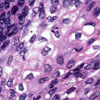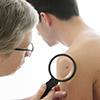Skin Cancer Overview
- Cancer and the skin
- Types of skin cancer
- Tests for skin cancer
- Prevention and treatment of skin cancer
- Patient experience
Cancer and the Skin
Cancer overview
 | Cancer, a condition of abnormal cell growth, is the second most common cause of death in developed countries. Normal cell growth is a carefully regulated process. Cancer cells replicate in an uncontrolled manner, and can move from one part of the body to another. |
For more information on cancer, see Cancer:Overview.
Anatomy of the skin
 | Human skin is considered to be the largest organ of the body. The surface area of the skin on an average adult is 1.8 m2, and represents 16% of the total body weight. The thickness of the skin varies throughout the body. |
For more information, see Anatomy of the Skin
Types of skin cancer
Basal cell carcinoma
 | Basal cell carcinoma is the most common form of skin cancer, accounting for more than 75% of all skin malignancies. Its incidence is greater with increasing age and it is almost twice as common in males. Geographically, the basal cell carcinoma tumour is found worldwide, but with striking geographical variation. |
For more information, see Basal Cell Carcinoma of the Skin.
Squamous cell carcinoma
 | Squamous cell carcinoma is the second most common form of skin cancer. It is more common in males and the ageing population. |
For more information, see Squamous Cell Carcinoma of the Skin.
Malignant skin melanoma
 | Melanomas are cancers of cells known as ‘melanocytes’ that are present in the skin. Sometimes, however, something can go wrong in a melanocyte. It becomes cancerous and grows very quickly, becoming bigger and bigger. The cancerous cells can eventually spread to other parts of the body where they can keep growing, causing damage to the surrounding structures. |
For more information, see Malignant Skin Melanoma.
Tests for skin cancer
Skin biopsy
 | Skin biopsy is a simple procedure which is usually performed by a general practitioner. A sample of skin is removed so it can be sent to a laboratory for testing, for example to see if the skin is affected by skin cancer. |
For more information, see Skin Biopsy.
Excision of a skin lesion
 | Removing a skin lesion (a lump, bump or discolouration), such as a skin cancer, is one of the most common clinical procedures that can be done in a GP clinic. The removal of a lesion is often the first and best treatment for many conditions, especially skin cancers, because if done correctly it not only completely gets rid of the problem but can also stop it from regrowing |
For more information, see Excision of a Skin Lesion.
Skin cancer prevention
Skin checks
 | Coming into the summer months, it is a good idea to have your skin checked for any suspicious lesions that may lead to skin cancer. |
For more information, see Skin Checks.
Preventing Skin Cancer
For more information, see Preventing Skin Cancer.
Protection against ultraviolet radiation
 | Ultraviolet (UV) radiation consists of high-energy rays which are invisible to the human eye, because they are outside of the colour spectrum which the human eye recognises (i.e. red, yellow, blue). Despite being invisible, UV rays can be very dangerous to the human body if over-exposure occurs. When UV rays come into contact with a human, they are absorbed by the cells of the skin. |
For more information, see Preventing Cancer: Ultraviolet Radiation.
Video: Skin health
 | The biggest organ in the body is skin. How do we keep it looking good, young and healthy? Dr Joe Kosterich talks about the functions of skin and how to look after your skin. |
Watch the video Skin Health.
Patient experience
My experience: Larry gives us the skinny on skin cancer
 | Life is hectic and checking for melanoma might not be top of your priorities at the moment, but after reading Larry’s story, you might want to get your partner, a mate or a Mum to check out your birthday suit. |
For more information see Melanoma: Larry gives us the skinny on skin cancer.
More information
Beauty
 | For more information on how to stay healthy and beautiful, including information about nutrition, smoking and cosmetics, see Beauty and Health. |
Dates
Tags
Created by:

 Login
Login















